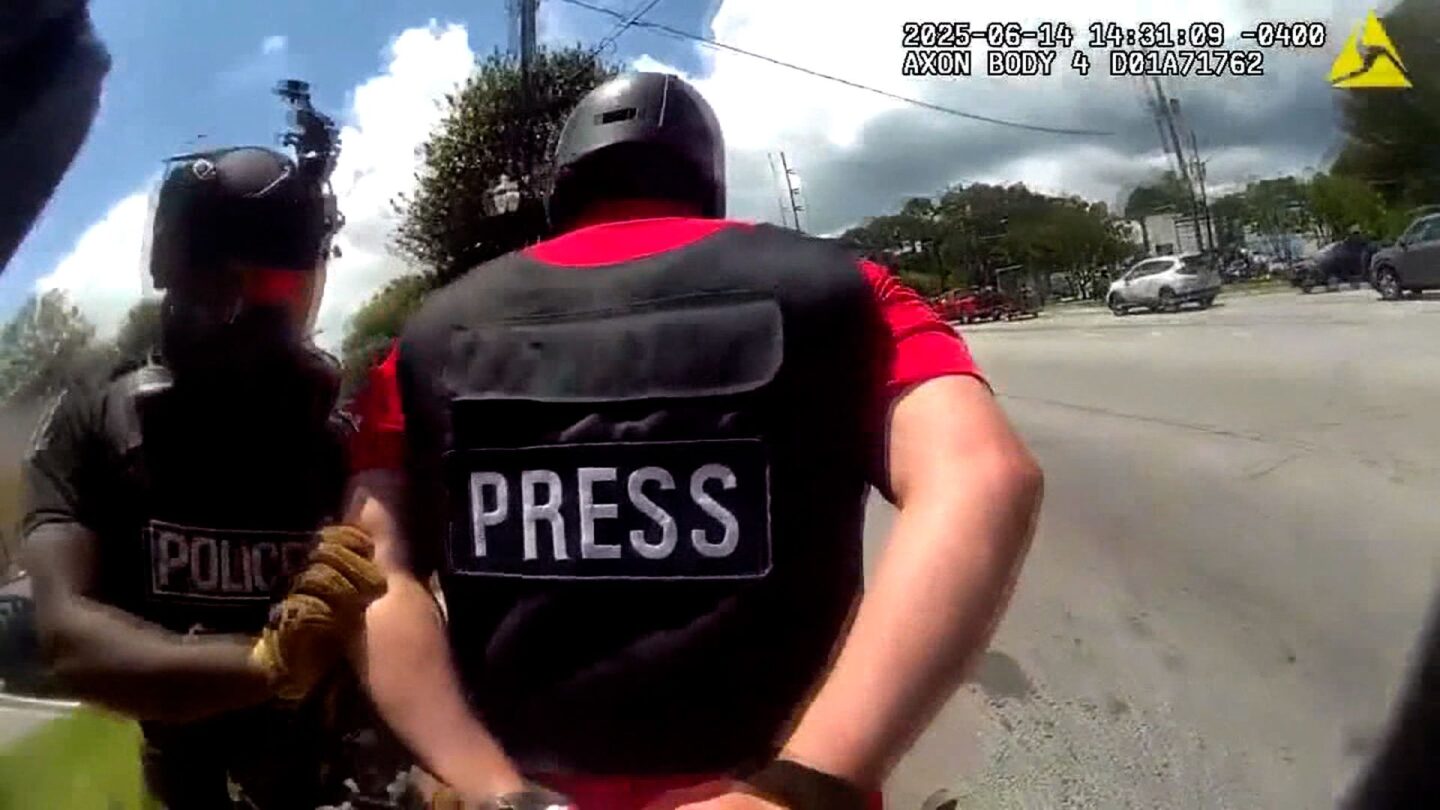Live-streaming journalist deported to El Salvador after months in ICE custody

By Liam Reilly, CNN
(CNN) — Mario Guevara, the Salvadoran journalist who gained popularity by documenting immigration raids, has been deported after spending months in federal custody.
Guevara was deported to his native El Salvador early Friday morning, the Committee to Protect Journalists (CPJ) confirmed to CNN, more than three months after the Spanish-language live-streamer was arrested while covering an Atlanta-area “No Kings” protest. He was transferred to US Immigration and Customs Enforcement (ICE) detention shortly after his arrest.
Moments after arriving at San Salvador’s airport on Friday, he was released by Salvadoran immigration authorities and is no longer expected to be taken to immigration facilities in the capital.
Speaking to reporters in El Salvador, Guevara said he felt “strong” and described his situation as bittersweet.
“I feel sad, but I also feel happy to be in my homeland. I mean, they didn’t execute me. Perhaps the racist government wanted to execute me. And I’m here in my homeland. So, at the end of the day, I think it’s a blessing,” he said.
Despite saying he was treated like a criminal by the US government, he insists he holds no resentment. “At the end of the day, they’re just following orders,” he said.
Guevara’s deportation comes after the Bureau of Immigration Appeals closed his case on September 19, ordering that he be removed from the US. The American Civil Liberties Union (ACLU), which represents Guevara, filed a temporary restraining order on Monday, but the court rejected it earlier this week.
“Journalists should not have to fear government retaliation, including prolonged detention, for reporting on government activity, and showing up to work should not result in your family being torn apart,” Scarlet Kim, senior staff attorney with the ACLU’s Speech, Privacy, & Technology Project, said in a statement. “Mario’s treatment should terrify any person in this country that cares about a free press.”
For months, groups including CPJ and ACLU criticized Guevara’s detention, which continued even after a Georgia immigration judge ordered his release on bond in early July. Dozens of press freedom groups and more than 100 leading writers, journalists and scholars called for Guevara’s release from ICE detention.
Although prosecutors dropped criminal charges stemming from Guevara’s arrest, determining that he had complied with law enforcement, the government argued that Guevara ought to be kept in detention, alleging his live-streaming of law enforcement activities presented a risk to their work.
“The only thing that journalists like Guevara threaten is the government’s chokehold on information it doesn’t want the public to know,” Seth Stern, director of advocacy at the Freedom of the Press Foundation, said in a statement.
Instead of releasing Guevara, the Board of Immigration Appeals reopened Guevara’s 13-year-old immigration case, which had been closed and authorized him to work in the US. The board claimed immigration courts cannot approve Guevara’s release, given his removal had previously been ordered in 2012.
Less than a week after his release was ordered in July, ICE was granted a stay by an immigration appeals court, effectively blocking Guevara’s bond, allowing for his continued detention.
During his time in custody, Guevara was the only known journalist detained by the US government.
“The Pledge of Allegiance to the flag of the United States says ‘with liberty and justice for all,’” Guevara wrote in a September letter published by the ACLU. “Right now, that is a fallacy. They should add, ‘except for immigrants.’”
In a piece for MSNBC, Guevara’s son, Oscar, wrote that the journalist “has not always been safe” throughout his detention. “Known for his journalism, even by others inside, he has had inmates take photos of him and threaten to hurt him should my family not pay $60 a day,” he wrote. “What else could we do? We paid.”
“Words cannot begin to describe the loss and devastation my family feels,” Oscar Guevera said in a statement the day before Mario’s deportation. “I am in utter shock and disbelief the government has punished my father for simply doing his life’s work of journalism.”
Guevara first entered the US in 2004 on a tourist visa and applied for asylum in 2005. He had fled his native El Salvador after receiving death threats over his reporting there.
Reporters Without Borders, which tracks the treatment of journalists globally, noted that “journalists regularly face threats and the seizure of their equipment” in El Salvador. Though no reporter has been killed there since 2016, journalist Víctor Barahona was detained and tortured from June 2022 to May 2023.
The Spanish-language reporter is best known for his coverage of immigration raids, which he often live-streams to his hundreds of thousands of followers across social media platforms.
During his 21 years in the US, Guevara worked for Mundo Hispánico, Georgia’s largest Spanish-language newspaper, before ultimately founding MG News in 2024. Guevara’s platform focuses on topics close to Georgia’s Latino community, including immigration.
Guevara has been nominated for a Southeast Regional Emmy Award on three occasions — in 2023, 2021, and 2019 — ultimately winning in 2021.
The-CNN-Wire
™ & © 2025 Cable News Network, Inc., a Warner Bros. Discovery Company. All rights reserved.
CNN’s Jose Alvarez and Michael Rios contributed to this report.
